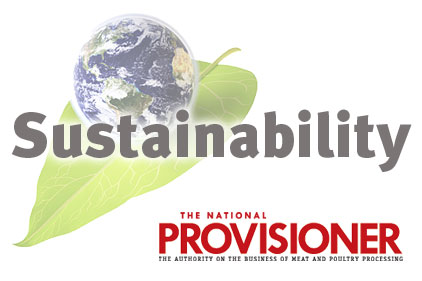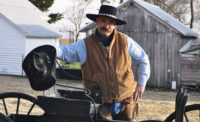Ranchers must be involved in 'future of food' discussions
Three farmers/ranchers participated in a New York Times conference on the future's food supply.

How do you envision the food of tomorrow? Pose that question to 100 people on the street, and you will be sure to get 100 different answers. GMOs, no-GMOs, antibiotics, antibiotic-free, sustainable, outsourced, local — we are far from a consensus. Answering this question is one of the most important challenges we face today, if not the most important. If you can’t feed the world, you can’t improve the world.
The New York Times decided to tackle this debate and start the conversation to “Farm better. Eat better. Feed the World” at its first-ever, two-day Food for Tomorrow conference held Nov. 11-12 in Pocantico Hills, N.Y. Joining in on the conversation were important voices of food, including the people who get their hands dirty everyday to bring our food from pasture to plate — American farmers and ranchers — thanks to sponsorship from the U.S. Farmers and Ranchers Alliance.
I was honored to be able to listen to the stories of three family farmers in their panel titled, “Big Ag, Big Food: How Being Good for the Environment is Not About Size.” Their passion for improving the business, educating themselves and others, and feeding the world healthy and safe food spoke volumes.
These farmers, handpicked by the U.S. Farmers and Ranchers Alliance, came from three different arenas of the "big ag” world.
• Julie Maschhoff — a pig farmer and vice president of her five-generation family farm in Carlyle, Ill.
• Bruce Rominger — a farmer and lamb producer of Rominger Brothers Farm in Winters, Calif.
• Joan Ruskamp — a cattle feeder in Dodge, Neb., whose family farm just celebrated its100-year anniversary
Each farmer brought an unmatched and important perspective to the event. All were proud of their profession, progressive in their thinking and ready to be brought into the conversation about feeding the world in a sustainable, healthy way.
They each expressed multiple key challenges in producing food today from a farmers’ perspective:
First, the conversation focused mainly on sustainability on three levels — economic, environmental and generational. They all spoke of the importance of instilling their passion for farming in future generations. Without these farmers fully educated and motivated, the conversation of sustainability and the possibility of keeping farming in America will end.
“We use the [phrase] 'legacy farm' because we intend to pass this on to the sixth and seventh generation,” Maschhoff said. "Sustainability is something we think about on the global level, but we have to execute locally.”
To ensure a sustainable future, the conversation also focused on constant improvement and education. Each farmer discussed the importance of being brought into the consumer conversation so that they could meet their demands.
“Tell me the way you want things grown, what animals and what kinds of crops you want,” Rominger said. "We will figure out how to do it.”
By doing more research and bringing in the “best and brightest minds” as Maschhoff said, farmers will focus their energy on providing the most sustainable and safe system to produce their food. These farmers showed great confidence in their product and procedure.
“I feel totally confident in telling them to go eat! I eat it. We need to eat protein because our bodies don’t make it. I know what all of our friends are doing [in farming]. We live in a mega-part of the country that feeds a lot of cattle. I know the standards we adhere to. I know the passion,” Ruskamp said. “Transparency is huge. The best compliment I have ever gotten was when a group came and someone said, ‘You act like you have nothing to hide.’ I [have nothing to hide].”
All of the farmers were energetic about having people visiting their farm, doing research and seeing how they do things; they all believed in complete transparency. Maschhoff agreed and knew that although her farm is the “big ag everyone was taught to hate,” she encourages openness about all of the work her farm does.
“As we grow, we become more and more under the microscope. We knew that and accepted that,” she said. “But that’s part of the price we pay for doing what we love, so we are willing to do that.”
There is and should be immense pride for farmers and everything they do to feed the world. These farmers have an important story to tell, but need a louder voice to tell it. Bringing them into the conversation and hearing their plans for a sustainable future helped to bridge the gap between producers and consumers, from pasture to plate.
“I am the voice for my farm, and my farm is unique to me. … We all have unique qualities about our farms, but in common, we want to feed you,” said Ruskamp. “We want to be part of the conversation you all are having about this. Please, let us be involved in your conversation about food for tomorrow and how we can do it better. How we can be healthier for it. We want to be part of it.”
For more information about this panel and the NY Times Food for Tomorrow Conference, visit www.nytfoodfortomorrow.com.
Looking for a reprint of this article?
From high-res PDFs to custom plaques, order your copy today!






